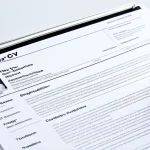Recruitment bias can quietly undermine your job search before the interview stage begins. Masking your CV strategically helps highlight your skills while minimizing details that may trigger unconscious prejudice. This approach enhances privacy and ensures recruiters focus on your qualifications, boosting your chances in competitive hiring processes. Discover practical methods to transform your resume into a powerful, anonymized tool that opens doors without revealing unnecessary personal information.
Essential Strategies to Mask Your CV for Better Job Prospects
Maximize your chances by mastering CV masking techniques.
Topic to read : What Are the Latest Trends Shaping the Future of Business Services in the UK?
Using anonymized resumes is a crucial strategy in today’s job market. It helps reduce unconscious bias that can occur during recruitment processes. By focusing solely on skills and experience, an anonymized CV presents a fairer candidate profile. This method promotes privacy by limiting the exposure of personal identifiers such as name, age, gender, and location.
To effectively apply CV masking techniques, start by carefully reviewing your document to identify any information that could trigger bias. For instance, remove details like your full name, graduation year, or even specific hobbies that reveal personal attributes unrelated to job performance. Then, replace them with neutral descriptors or simply omit these details without compromising the clarity of your qualifications.
In the same genre : Prototyping event decorations: bringing your vision to life
Implementing these job search tips benefits not only candidates seeking equitable employment but also fosters a more inclusive recruitment environment overall. Maintaining privacy through anonymized resumes ensures your qualifications speak for themselves, increasing the likelihood of unbiased assessment.
10 Proven Methods to Anonymize and Tailor Your CV
When aiming to optimize your job prospects, implementing blind CV strategies can make a significant difference. These methods help eliminate bias and highlight your true potential by focusing on skills and achievements rather than personal identifiers.
Remove Personal Identifiers
One of the most critical steps in CV anonymization is to remove personal identifiers such as your name, address, phone number, and email. The objective is to ensure recruiters evaluate your application based on merit alone. For example, replacing your full name with initials or simply omitting contact information until later application stages can reduce unconscious bias.
Generalise Specific Job Titles
Instead of listing very specific job titles, use broader, skills-focused descriptions. This effective resume modification technique prevents recruiters from making premature judgments based on the seniority or exact nature of your previous roles. For instance, instead of “Senior Marketing Manager for Automotive Division,” use “Senior Marketing Manager – Consumer Products.”
Omit Exact Employment Dates
While employment dates are often necessary, omitting exact months or years can prevent biases related to age or career gaps. You could list only years or use ranges like “2018–2021” rather than precise start and end months. This approach aligns with blind CV strategies designed to focus on your skills over chronological factors.
Focus on Skills-Based Descriptions
Emphasizing what you can do rather than where or when you have done it is paramount. Highlighting abilities, tools mastered, and results achieved within your job descriptions enhances the CV’s impact. This method attracts recruiters looking for specific competencies without getting distracted by contextual details.
Use a Blind CV Template
Utilizing a dedicated blind CV template can streamline the anonymization process. These templates are designed to exclude or mask personal data and prompt you to frame your experience in a neutral, yet informative way. This ensures consistency across your applications and improves your chances in a competitive recruitment landscape.
Minimise Education Age Markers
You can further anonymize by avoiding education dates or graduation years, which can signal age to employers. Instead, list qualifications and relevant certifications without attaching time frames unless expressly required. This adjustment aligns with CV anonymization best practices aiming to create a level playing field.
Exclude Nonessential Hobbies or Interests
Personal interests unrelated to the role can inadvertently reveal identity markers or distract from your qualifications. Removing or carefully curating hobbies focuses attention on your professional profile and reduces potential bias.
Standardise Employer Names
Using generic employer descriptions can help in anonymizing your CV. For example, instead of naming a specific company, describe it as “Leading International Financial Institution” or “Top-Tier Technology Firm.” This practice helps avoid preconceived notions associated with certain companies.
Quantify Achievements Without Identifiers
When including accomplishments, share measurable results without linking them to confidential or identifying content. For instance, mention “increased sales by 20% over two years” without specifying client names or proprietary projects. This keeps your CV impactful yet compliant with confidentiality.
Customise CVs for Each Application
Lastly, personalizing your CV to the job description while maintaining anonymized elements strengthens your application. Tailoring keywords and skills to match each role demonstrates relevance and engagement without compromising blind CV strategies.
These methods together form a comprehensive approach to CV anonymization and tailoring that maximizes fairness and your chances of success.
Examples and Templates for Each CV Masking Strategy
Helping you see and apply anonymization clearly
Using anonymized CV examples is a smart way to understand how to remove or mask personal information effectively. One common practice is to eliminate names, addresses, and contact details, ensuring the CV focuses solely on skills and achievements. For instance, instead of listing a full name at the top, you might replace it with a role title such as “Experienced Marketing Specialist.” This simple change helps reduce unconscious bias during recruitment.
When it comes to CV templates, having clear, structured models makes the anonymization process straightforward. Many downloadable CV templates are designed either as blind CVs, which omit all personal identifiers, or as skills-based CVs, which highlight competencies over chronology. A blind CV template typically includes sections like “Professional Summary,” “Core Skills,” and “Relevant Experience,” but avoids dates or company names that might reveal identity. Skills-based templates emphasize abilities, grouping qualifications under headings like “Technical Skills” or “Project Management.”
To apply these masking techniques practically, a few tips can help:
- Focus on content over context: Remove or generalize location and company specifics without losing key accomplishments.
- Use generic terms for dates or replace them with durations, e.g., “3 years at a leading retail company.”
- Be consistent throughout the CV to maintain professionalism and readability.
Mastering these practical resume tips can make a significant difference in how your CV is perceived, leveling the playing field for all applicants.
Analyzing the Impact and Effectiveness of Masked CVs
Understanding how anonymizing resumes transforms hiring
Research consistently shows that hiring bias reduction improves significantly with the use of masked CVs. By removing identifiable details like name, gender, age, and ethnicity, recruiters focus strictly on skills, experience, and qualifications. This shift reduces unconscious bias, which often narrows candidate pools unfairly. Multiple studies reveal that anonymized CVs not only level the playing field but also increase the chances of diverse candidates advancing to later stages in recruitment.
Job seekers who adopt CV effectiveness strategies through masking techniques report markedly better outcomes in their searches. For example, applicants from underrepresented groups have found that anonymized resumes helped them secure interviews that might otherwise have been inaccessible. These real-world success stories underscore the practical benefits of masking personally identifiable information while highlighting candidates’ true professional merits.
Maintaining transparency while protecting privacy requires balancing. Candidates are encouraged to use clear job-related achievements and quantifiable results on their masked CVs to ensure recruiters gain a comprehensive understanding of their capabilities. At the same time, erasing or generalizing personal data helps uphold privacy without hindering the evaluation process. For those interested in practical steps on how to do this effectively, resources such as https://hiringnotes.com/recruiter/convert-anonymous-cv outline methods that optimize both privacy and clarity.









